Will King Charles’ Coronation Save the Monarchy—or Hasten Its Demise?
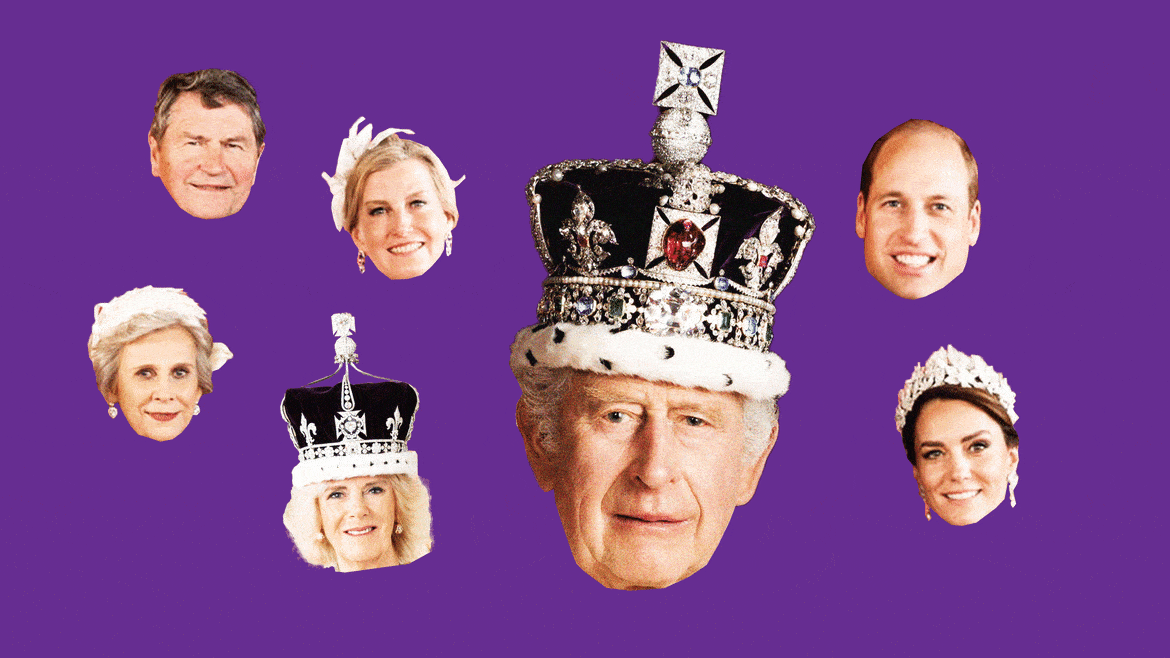
Royalist is The Daily Beast’s newsletter for all things royal and Royal Family. Subscribe here to get it in your inbox every Sunday.
Tom Sykes: Now that the dust has settled and the bunting packed away, I guess it’s a good time to sit back and reflect on what the past 72 hours have told us about the monarchy and the country.
There was certainly no shortage of headline grabbing moments, whether that was Katy Perry failing to find her seat, now-you-see-him, now-you-don’t Harry being upstaged by Princess Anne’s feather, the hot equerry riding again, or William and Charles’ surprisingly tender moment in the abbey when Charles, who looked as baffled as the rest of us for most of the afternoon, mumbled, “Thank you, William” to his son as he kissed him, and pledged his allegiance.
The saga of Harry being there and leaving so quickly (as he had always said he would, to be home for Archie’s birthday), the finery, the Palace balcony moment, the rain, Prince Louis at his first official engagement stealing the show at the volunteering-focused Big Help Out on Monday—there were media-made moments all over the place. In private, at a family gathering after the voronation, Charles reportedly wished Archie a happy birthday, “wherever he was,” and said he was “quite disappointed” Harry wasn’t there.
King Charles Releases Bling-tastic Official Coronation Portraits
Later Monday, the palace released the official portraits from the coronation, and Charles said he and Camilla were “rededicating” themselves to serving the people. But how will they do that, and how successful will they be doing it—particularly with a rising number of Commonwealth countries wanting to pull the plug, and anti-monarchist sentiment even closer to home?
Despite the undoubtedly impressive display—as is often remarked, the British do pomp and ceremony better than anyone else—and the wonderful music, I found the actual ceremony unconvincing and inauthentic. Charles and Camilla looked completely zonked out for most of it, which didn’t help.
I was discussing it with our editor, Tim Teeman, and he said that it felt a bit like going to a Broadway show, where, despite the fact that it has a great cast, perfect lighting, and nobody has flubbed their lines, that special something just isn’t there. But maybe that’s just the nature of a coronation. How does it compare to 1953?
Clive Irving: In 1953 divorced men were not allowed to read the BBC news. Divorce carried a stigma. The queen’s sister, Princess Margaret, was discouraged from marrying Group Captain Peter Townsend, even though he was the innocent party in his divorce and he was a respected and trusted aide to the family.
In 2023 we watched a divorced prince be crowned and his former and divorced mistress become queen. When the crown bearing $70 million worth of diamonds was lowered on Camilla’s head in Westminster Abbey I thought she looked fulfilled, as though finally she had made it. In this one scene of the show, she was the symbol of a huge leap in social attitudes since the coronation of Elizabeth II.
Otherwise, however, there was little recognition of change. The king declared, “I come not to be served but to serve” and that they were there to “celebrate the life of our nation.”
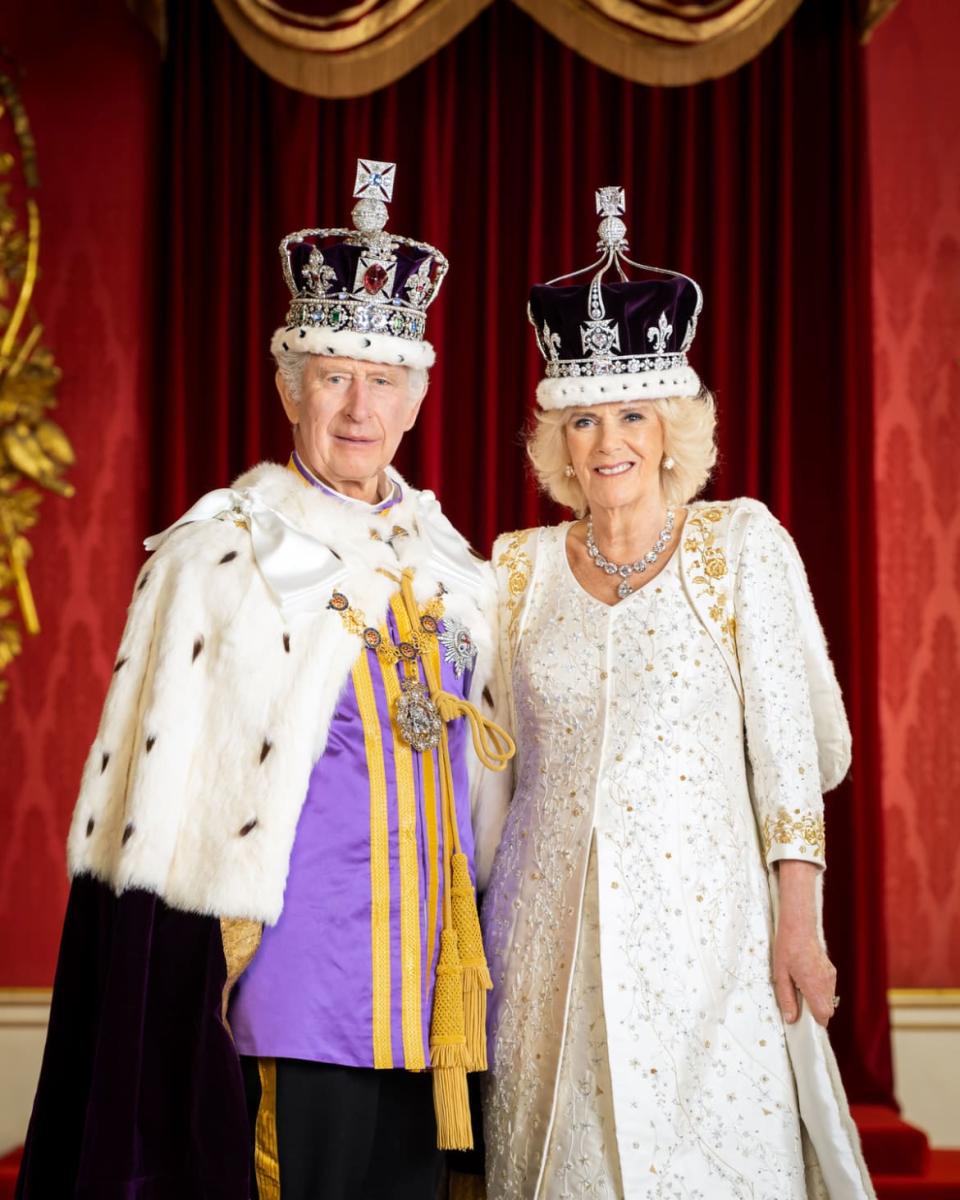
King Charles and Queen Camilla.
What nation would that be?
Not the one represented by the congregation in the cathedral. In a nation where half the people have no religious affiliation at all and only 15 percent are avowed followers of the Church of England, this was a full-on version of God as perceived by the Protestant faith, with all the medieval trappings.
It was an unsettling reminder of how deeply the monarchy is tied to the Protestant God, and how the embodiment of that bond is the head of state, in a kind of shorthand version of the British constitution. Hymn after hymn, ritual after ritual, it dragged on for hours, testing many bladders.
We were told in advance that Charles would extend his hand to other faiths but there was little evidence of it until, at the end, as he left, at the door by the Abbey gift shop, a small group of elders of other faiths genuflected while he offered a perfunctory nod and moved on. It reminded me of the day in 1918 in Jerusalem when General Allenby, having defeated the Ottoman Turks, entered the city gates and offered a similarly perfunctory nod to the Holy City’s religious leaders.
I also felt another gulf between 1953 and 2023. In 1953 the queen’s subjects had a quality of life so restricted by years of economic austerity that an opulent coronation was greeted as a welcome boost to the spirits. There was no sense of this being out of place, against the public experience and mood.
In 2023 it’s quite the opposite.
King Charles must know that once he steps outside the world of the pageant and back into reality, the country is distressed. There are enormous inequities of wealth and living standards. His government has just suffered enormous losses in local elections and will almost inevitably be kicked out of power at the next election for their many derelictions.
But because he can’t speak about that in any explicit way, the danger is that he will seem increasingly irrelevant.
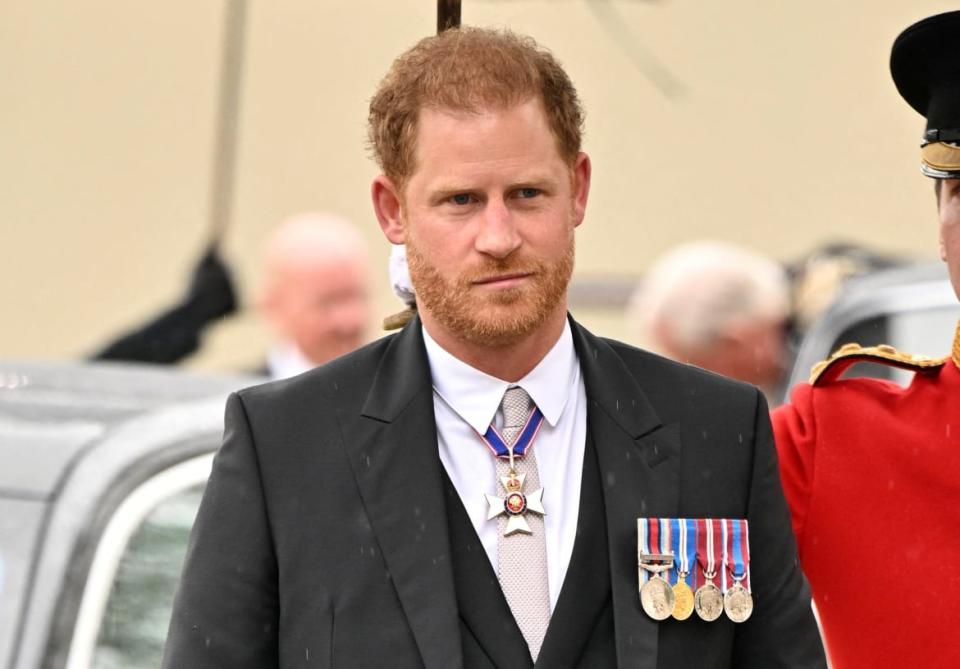
Prince Harry arrives for the coronation of King Charles at Westminster Abbey, London, Britain, May 6, 2023.
Tom: The coronation concert on Sunday night showed one path to relevancy: environmental advocacy. To me, that was the most intelligent marker laid down for the future; Charles the green king works. He has the history and he might just even be the right man at the right time, a figure who can persuade the recalcitrant, Brexit-voting older generation of the moral imperative of transitioning to net zero.
Charles’ activism in the environmental arena is going to bring a strange new political with a small p dynamic to the business of monarchy. I can’t see him stopping talking about the environment for one moment.
Clive: And the dancing?
Tom: Well, they at least came off as human on Sunday night, doing their cringey dad-dancing to Lionel Richie. It was cute.
But the big problem, to go back to the play/musical metaphor, is the lack of spark between our leading man and lady. For two people who have been through hell and high water to be together, at the coronation at least, Charles and Camilla had astonishingly little on-camera chemistry. In the social media era, that’s a problem, because there are 60 million other people in this relationship and they all have a platform to express themselves.
The great British public don’t mind Charles, but they definitely do not like Camilla very much at all.
Clive: Queen Camilla, Tom.
Tom: Yes, well, I strongly feel that the whole Queen Camilla thing is going to turn out to be the most epic unforced error of his reign.
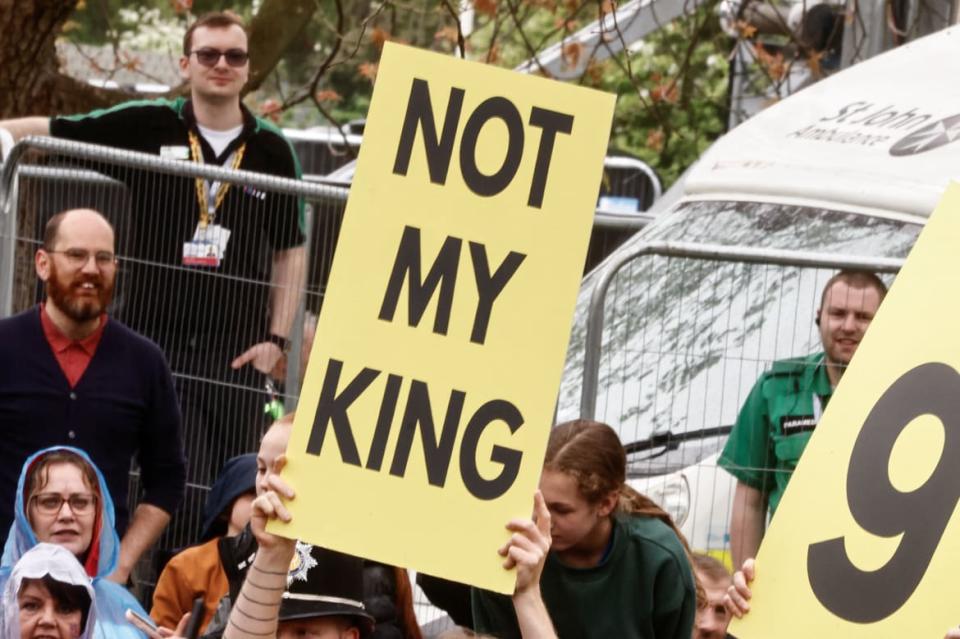
Anti-monarchy demonstrators protest on the day of Britain's King Charles' coronation ceremony, at The Mall in London, Britain May 6, 2023.
She remains quite phenomenally unpopular, as all the latest polling shows, and what I simply don’t understand is why, having come up with a perfectly acceptable compromise solution, signed off by the late queen, where she was going to be known by the slightly odd title of queen consort, why the hell did Charles then say she has to be queen?
I think the Queen Camilla thing has huge potential to derail Charles’ reign. I’m sure I can’t be the only one who was sitting there, thinking how much different this whole thing would’ve looked and felt with Princess Diana on the throne instead.
Clive: Yes, I had the same feeling. It was impossible not to imagine the big What If and contemplate how different the monarchy might look now had Charles remained with Diana. Alas, we have to face the king we have, not the one Diana might well have transformed. Charles seems very gaffe-prone.
Tom: So why is this happening?
Clive: There are always hidden hands behind the king’s actions. With each reign you have to wait for the real influencers to win the royal ear. It’s not yet clear whose advice is working with Charles. So far it looks like the king’s private secretary, Clive Alderton, still has to prove that he’s up to the job. In terms of power, he has to defer to the Cabinet secretary, Simon Case. As head of civil service, as well as the enforcer for the prime minister, he is the most powerful figure in the nexus between the government and the monarch.
Case was far from diligent in his handling of the “Partygate” scandal that eventually sank Boris Johnson’s career. He was similarly damaged by his involvement in giving the top job at the BBC to a man who had made a massive loan to Johnson. More intriguingly, he was private secretary to Prince William when he made his deal with Rupert Murdoch to settle the phone hacking case—undercutting Harry, who is determined not to settle and get his day in court.
The biggest gaffe of the coronation ought to have been caught by Alderton and Case: the idea of having the people pledge allegiance to the king and his successors as though they were medieval peasants. The wording was changed at the last minute, to an invitation to “offer their support” and the idea of pausing to allow the TV audience to pay their homage was dropped.
The idea was hatched in another palace: Lambeth Palace, home of the Archbishop of Canterbury. After many years of trying to track the interplay of the sacred and profane worlds around the crown, I found this episode quite tricky to unpick. The current archbishop, Justin Welby, who so obviously loved the limelight of presiding over the coronation, made no bones about his distaste for the depravity of the Johnson government. Many Tories regard him as a leftie. The left regards him as a closet capitalist because before he took the cloth he was an oil company executive.
But the pledge of allegiance reeked of a belief in the genuflection of the masses before the monarch. After the whole idea blew up, Welby claimed that he didn’t know whose idea it was. Charles’s biographer and acolyte, Jonathan Dimbleby, said that although Charles had micro-managed the Coronation plans he had somehow missed this and would find the idea abhorrent. Dimbleby added a little smear by implying that Welby believed in a kind of charismatic evangelicalism. As we know, Charles has a habit of fleeing the scene of a crime, as he did with the cash-for-honors scandal at his charity, the Prince’s Trust. So, quite honestly, we don’t know whose head should roll for this one.
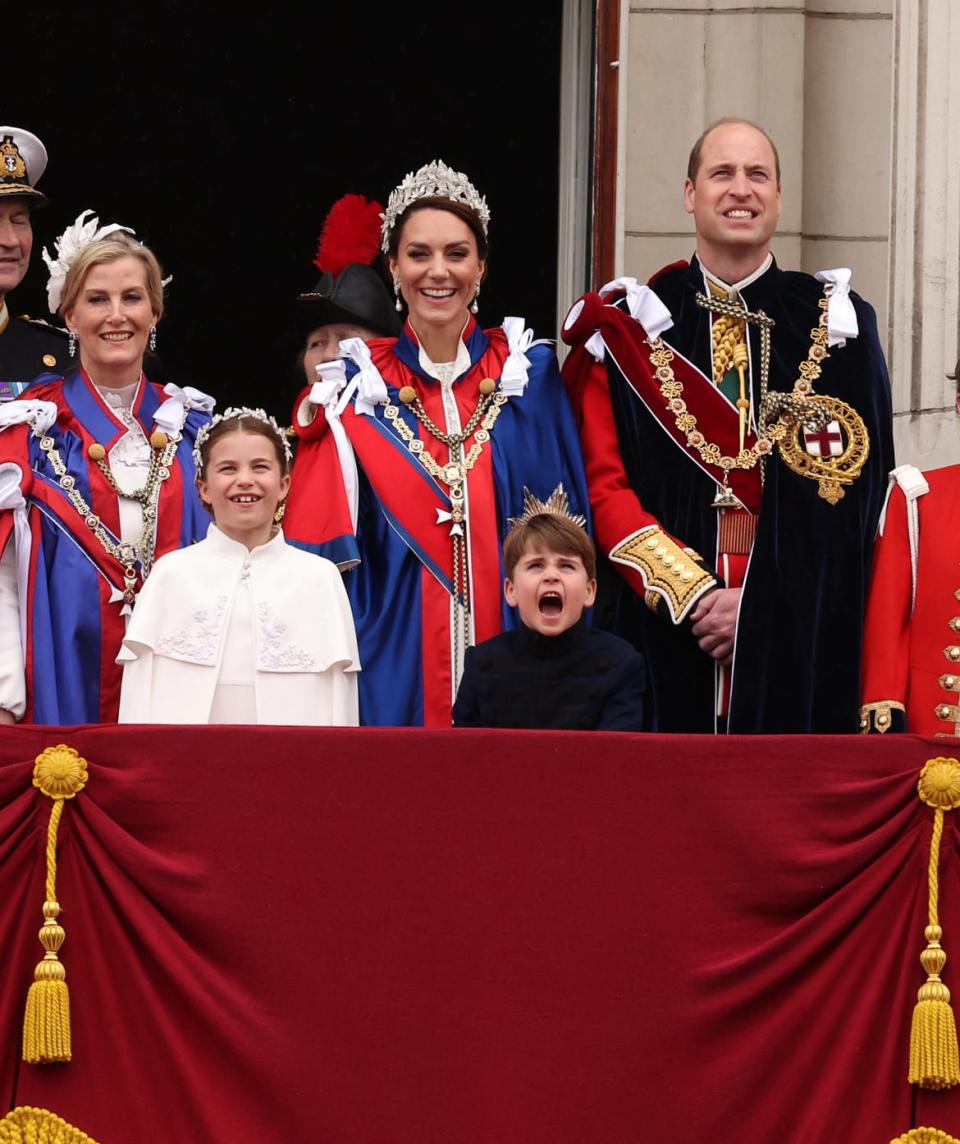
Britain's Prince William, Catherine, Princess of Wales, and their children Princess Charlotte and Prince Louis stand on the balcony of Buckingham Palace. Photographed from Queen Victoria Memorial.
Tom: People don’t like having this kind of rubbish forced down their throats. Divine right? Please. The days of kings telling us how the world is and us all going along with it are well and truly over. Witness the outrage over the arrests of the anti-monarchy protesters over the weekend.
Clive: Yes, Tom, but after years watching how easy it has been for really reactionary people to hijack the American constitution and to pervert it to their own ends, I’m thinking that there’s possibly more than a touch of genius about how nobody really knows how our constitution works. Symbolically it hinges on the monarch as head of state. Quite a few experts on this opaque arrangement feel that abolishing the monarchy would unravel the whole apparatus. How do you feel about the prospects for its future now?
Tom: On balance, you’d have to say the events of the weekend fortified the brand. They ain’t going anywhere, are they? A third of the population tuned in to watch an archaic ceremony rooted in the 11th century. That’s some cultural ballast.
The media coverage was one long orgasm, and the Palace did an excellent job as fluffers extraordinaire. The backstage images, the artful deployment of the increasingly glamorous Waleses to fill any gaps, including Louis driving his digger on Monday morning. It was masterfully done. You’d never think this was a family that has essentially been having a massive screaming match for about the last five years.
Clive: I’m not so sure. The queen served as a mask of serenity behind which lay a mass of unresolved issues about the scale and the purpose of the royal house of Windsor. These will now be publicly aired and debated. Many serious critiques of the royal household are not coming from republicans, and can’t any longer be dismissed. They are coming from politicians and constitutional experts who want to see a king capable of reshaping the monarchy to the realities of the times, not allowing it to drift on as a pseudo-historical fantasy conducted on a scale that simply cannot any longer be justified.
There are many parties with a self-interest in keeping this ramshackle cavalcade rolling. At the moment they appear to have the upper hand—the fact that Princess Anne had the gall to say that a further slimming down of the monarchy was not a good idea indicates the depth of the resistance.
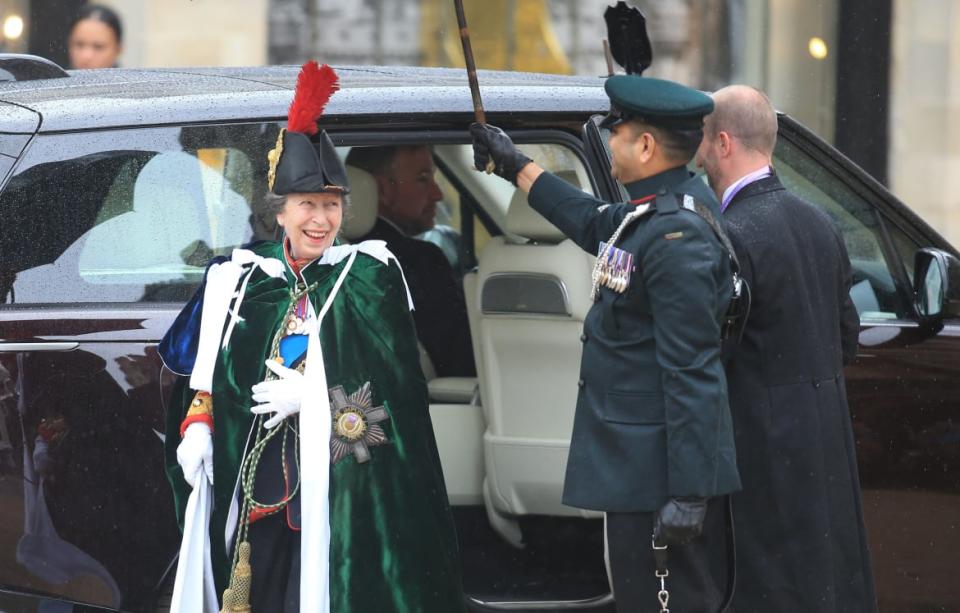
Britain's Princess Anne arrives to attend Britain's King Charles and Queen Camilla coronation ceremony at Westminster Abbey, in London, Britain May 6, 2023.
Tom: Anne’s remarks—she said, when asked about the idea of a “slimmed down” monarchy in an interview with Canadian TV, that it was originally proposed “when there were a few more people around,” adding: “It doesn’t sound like a good idea from where I’m standing”—were an apposite reminder of how badly the family have fucked up on Harry and Meghan. The idea that the only three non-white members of the family were not on that balcony, while Camilla’s posh grandkids were, risks making the oft-stated royal commitment to diversity look like lip service.
To avoid that impression, Charles needs to take the slavery issue by the horns. A proper independent inquiry into how the royals profited from slavery and a meaningful program of reparations must be on the cards. Such a move might also slow the rate at which foreign realms are ditching Charles as head of state.
Clive: The almost daily editions of the Meghan and Harry saga, conveniently for the royals, have served to help us forget that in this family the one who has done the most damage to the moral standing of the brand is Andrew.
Tom: Well, quite. But—the royals have won the Harry and Meghan battle domestically. Harry and Meghan are widely hated now in the U.K.
Harry’s in-and-out burger was humiliating for him, and he cut a hugely diminished figure. I don’t think anyone was buying the line that he had to get back for Archie’s birthday party. The truth is that the royals have been complete arseholes to Harry and Meghan, but manage to keep making themselves look the bigger people; full marks to whichever evil genius at the Palace leaked that Charles made a post-coronation toast to Archie “wherever” he was on his fourth birthday. You know where he was pal! At home—because you didn’t offer him a job or a ride in the golden carriage!
I don’t think we will see Harry at another royal event until the death of his father, and I can’t see him attending King William’s coronation.
Now, all eyes will turn to the future. I think the institution is probably doomed to become less relevant and influential as the years march onwards just because Charles and Camilla are so crusty and old-fashioned. But they are starting from a high base.
The best hope for long-term survival, really, is for Charles to push and push and push some more his green messaging and then have the humility to abdicate, maybe on the occasion of his 80th birthday, and become a wise old king emeritus and leave the showbiz to the younger and more good looking members of the cast, before the ratings collapse completely.
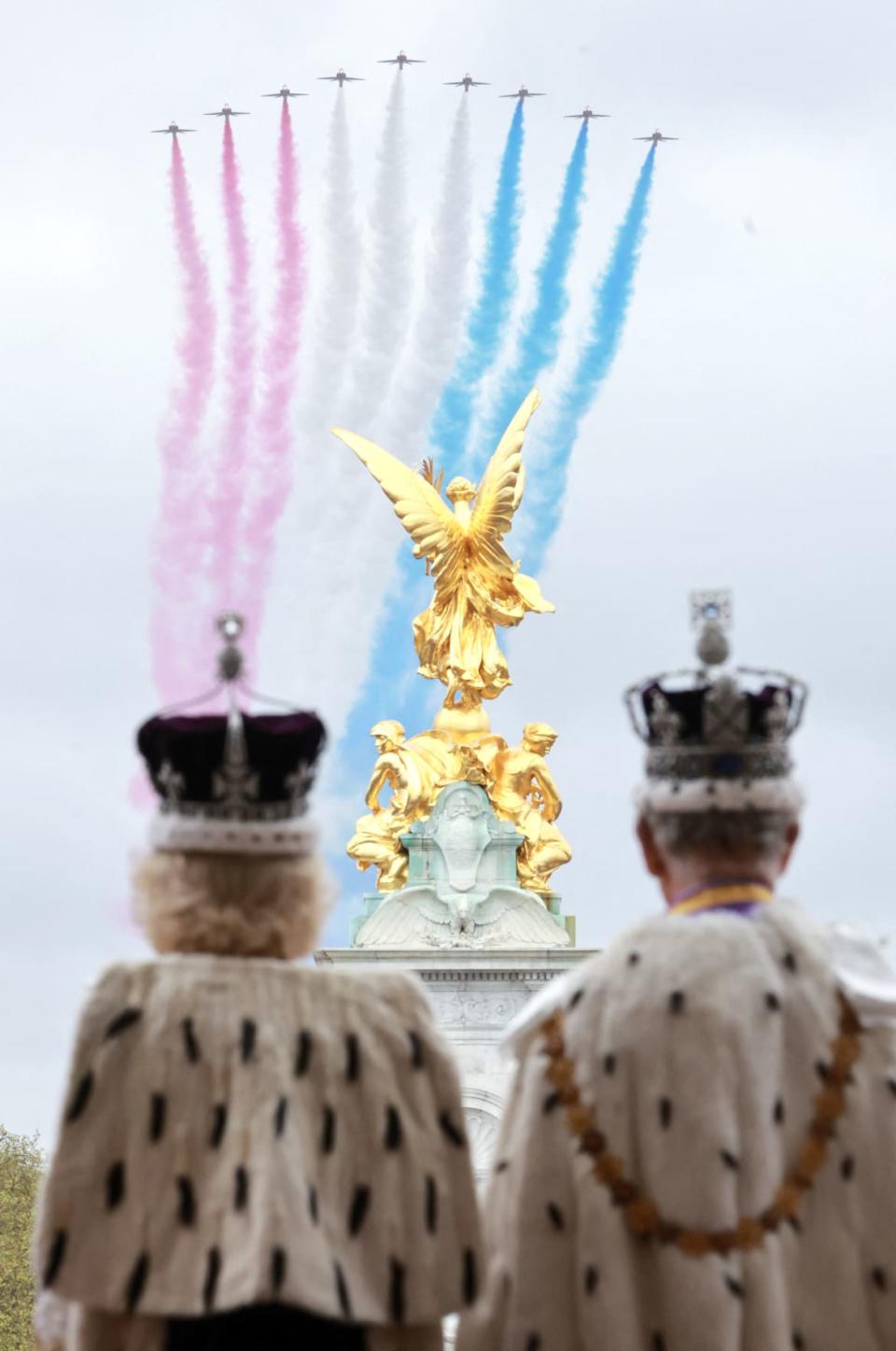
A handout image released by Buckingham Palace showing Britain's King Charles III and Queen Camilla as they watch the flypast from the balcony of Buckingham Palace after their coronation on May 6, 2023 in London, Britain.
Get the Daily Beast's biggest scoops and scandals delivered right to your inbox. Sign up now.
Stay informed and gain unlimited access to the Daily Beast's unmatched reporting. Subscribe now.


